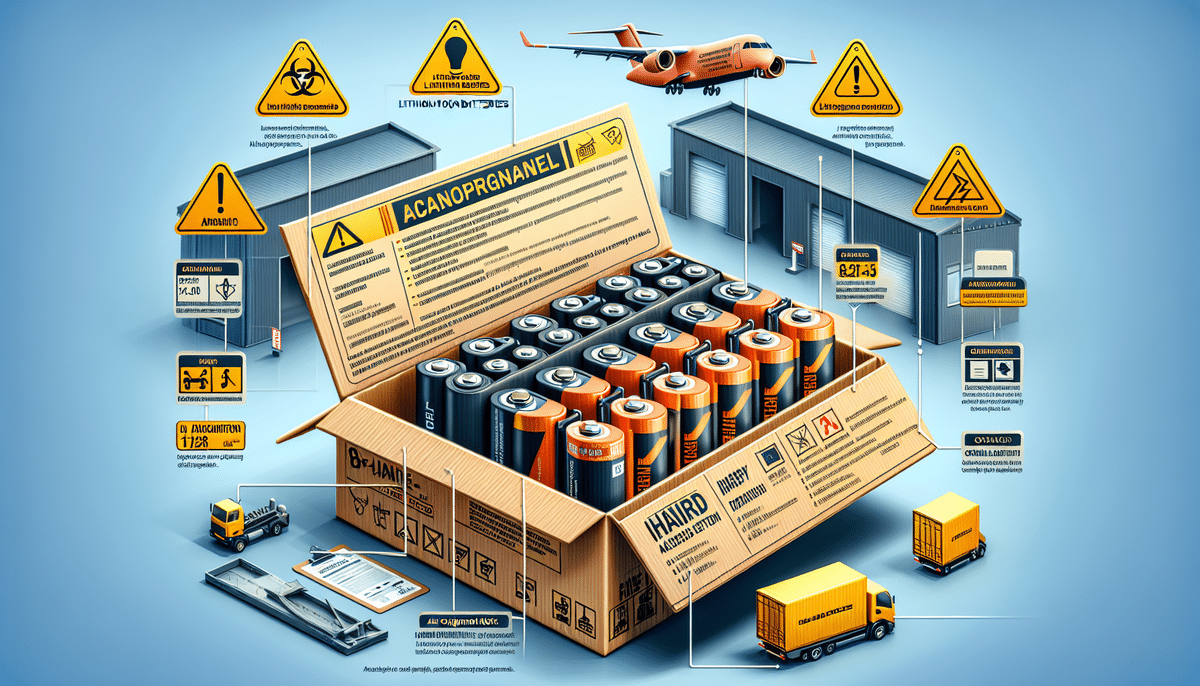FedEx's Updated Guidelines for Shipping Lithium Batteries
Shipping items containing lithium batteries requires careful adherence to safety protocols to prevent accidents and ensure compliance with international regulations. FedEx has released comprehensive guidelines aimed at facilitating the safe transportation of these high-energy devices. This article explores the key aspects of these guidelines, their implications for businesses and individuals, and best practices for compliance.
Understanding the Hazards of Lithium Batteries
Lithium batteries, while essential for powering a myriad of electronic devices, pose significant risks during transportation. Their high energy density makes them susceptible to overheating, especially if damaged or improperly handled. According to the U.S. Department of Transportation, incidents involving lithium batteries can lead to fires or explosions, underscoring the importance of stringent shipping protocols.
The chemistry of lithium batteries allows them to store a large amount of energy in a compact space. When compromised, such as through puncture or exposure to extreme temperatures, they can undergo thermal runaway—a chain reaction leading to uncontrollable heating and potential ignition.
FedEx’s Packaging and Labeling Requirements
Proper packaging and labeling are paramount in mitigating the risks associated with shipping lithium batteries. FedEx mandates that all packages containing lithium batteries must:
- Use Approved Packaging: The packaging materials must comply with the International Air Transport Association (IATA) Dangerous Goods Regulations, ensuring they can withstand shocks and prevent short-circuiting.
- Include Appropriate Labels: Packages must display clear labels indicating the presence of lithium batteries, including the UN number, proper shipping name, and hazard class.
- Provide Accurate Documentation: Detailed documentation outlining the battery type, quantity, and handling instructions must accompany the shipment.
Compliance with International Shipping Regulations
Shipping lithium batteries internationally involves navigating a complex landscape of regulations. FedEx guidelines align with global standards, including those set by the IATA for air transport and the International Maritime Dangerous Goods (IMDG) Code for sea transport. Key compliance requirements include:
- Battery Classification: Determining whether the battery is lithium-ion or lithium-metal, as each type has specific shipping restrictions.
- Watt-hour Limits: Batteries must not exceed certain watt-hour ratings to be eligible for air transport.
- Quantity Restrictions: Limits on the number of batteries per package to reduce the risk of fire proliferation.
Failure to adhere to these regulations can result in fines, shipment delays, or confiscation of the batteries.
Best Practices for Safe Shipping of Lithium Batteries
To ensure the safe and compliant shipment of lithium batteries, businesses and individuals should adopt the following best practices:
- Thorough Packaging: Use materials that absorb impacts and prevent battery movement within the package.
- Isolation of Terminals: Cover battery terminals with non-conductive materials to prevent short-circuiting.
- Temperature Control: Avoid exposing batteries to extreme temperatures during transit.
- Training Staff: Ensure that personnel involved in packaging and handling are well-versed in safety procedures and regulatory requirements.
- Regular Compliance Checks: Stay updated with the latest regulations and adjust shipping practices accordingly.
Consequences of Non-Compliance
Non-compliance with FedEx's lithium battery shipping guidelines can have severe repercussions, including:
- Financial Penalties: Regulatory bodies may impose hefty fines for violations.
- Shipment Rejection: FedEx may refuse to transport non-compliant packages, leading to delays and additional costs.
- Safety Risks: Improperly shipped batteries can result in fires, explosions, and environmental contamination.
- Reputational Damage: Businesses may suffer loss of trust and credibility if associated with hazardous shipments.
Future Trends in Lithium Battery Shipping Regulations
The landscape of lithium battery shipping is continually evolving, with increasing emphasis on safety and environmental sustainability. Anticipated trends include:
- Stricter Regulations: Governments and international bodies are likely to introduce more rigorous standards to enhance safety.
- Technological Innovations: Advances in packaging materials and battery design aimed at reducing risks.
- Enhanced Tracking: Improved monitoring systems for real-time tracking of shipments to promptly address any issues.
- Increased Recycling Efforts: Greater focus on the recycling and proper disposal of lithium batteries to minimize environmental impact.
Staying abreast of these trends is essential for businesses to maintain compliance and ensure the safe transportation of lithium batteries.
Choosing a Reliable Shipping Carrier
Selecting a reputable shipping carrier is crucial for the safe transport of lithium batteries. A reliable carrier should:
- Expertise in Hazardous Materials: Possess the necessary experience and knowledge to handle lithium batteries safely.
- Advanced Safety Protocols: Implement comprehensive safety measures and utilize state-of-the-art technology to monitor and manage shipments.
- Compliance Assurance: Ensure all shipments adhere to the latest regulations and industry standards.
Working with a dependable carrier not only mitigates risks but also streamlines the shipping process, ensuring timely and secure delivery of lithium battery-containing items.
Conclusion
Shipping lithium batteries demands meticulous attention to safety and regulatory compliance. FedEx's updated guidelines provide a framework to navigate the complexities of transporting these high-energy devices securely. By adhering to proper packaging, labeling, and documentation standards, and by staying informed about evolving regulations, businesses and individuals can mitigate risks and ensure the safe delivery of lithium battery-containing items. Embracing best practices and partnering with reliable carriers are pivotal steps in fostering a safe and compliant shipping environment.




















